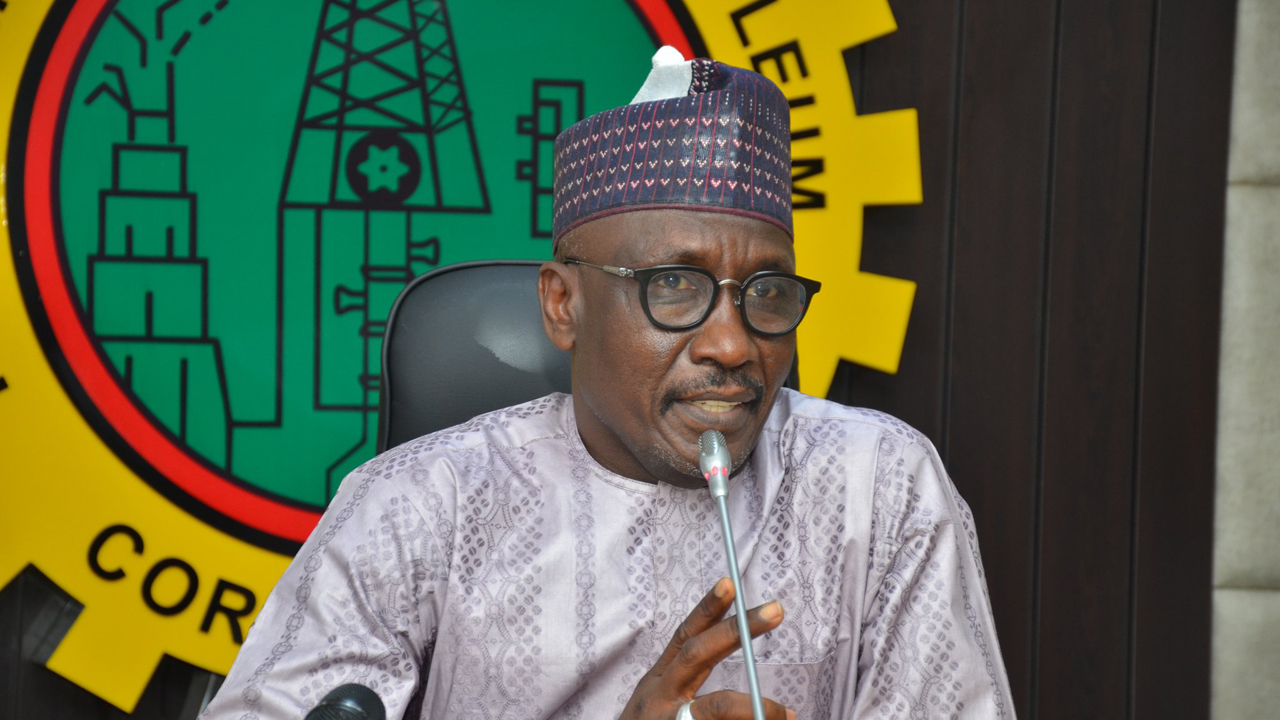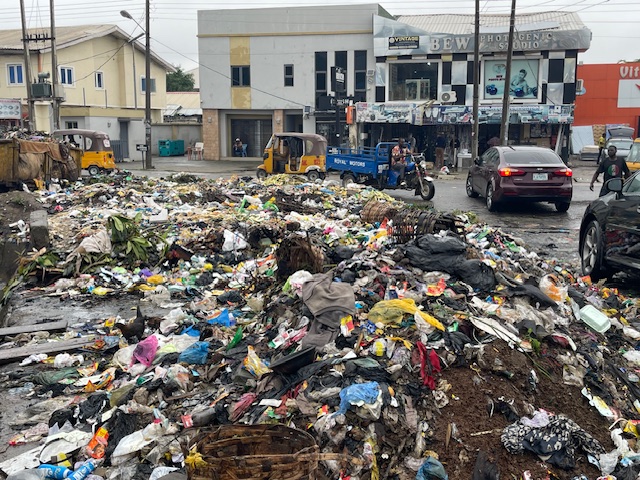
The Nigerian National Petroleum Corporation (NNPC) started its week with renewed synergy with the Department of Petroleum Resources to achieve their shared vision of optimising the nation’s vast hydrocarbon resources for the benefit of the government and people of Nigeria.
Group Managing Director of the NNPC, Malam Mele Kyari, and the Director/CEO of DPR, Mr Sarki Auwalu, made the commitment during a visit by the NNPC GMD to the headquarters of the regulatory agency in Abuja.
Kyari, who was accompanied by members of the Top Management Committee (TMC) of the Corporation, commended Auwalu for superintending over the transformation of DPR from a policeman of the oil and gas business to the business enabler of the sector.
While commending the DPR for its innovative approach to industry challenges, he said that the fate of the oil and gas industry and by extension the prosperity of the nation rested on the shoulders of both the NNPC and the DPR.
He assured that the NNPC was working closely with DPR and other stakeholders to supply more gas to the domestic market.
Earlier, the DPR Director, commended the NNPC GMD for making first profit in 44 years of the corporation’s existence, the commencement of the NLNG Train 7 project, the OB3 gas pipeline project, the Ajaokuta-Kaduna-Kano (AKK) project and spearheading the passage of the Petroleum Industry Act (PIA).
He said Kyari, since assumption of office, has recorded a lot of landmarks which would remain indelible.
Also in the week, the NNPC consolidated on the remarkable achievement of declaring N287 billion profit after tax in 2020 by publishing the Audited Financial Statements (AFS) on its official website in line with president Muhammadu Buhari’s directives .
Among the highlights of the 2020 AFS is the Corporation’s group profit which rose from a loss position of N1.7billion in 2019 to a profit of N287bn in 2020, for the first time in 44 years.
Kyari attributed the turnaround to aggressive cost cutting, automation of the system and renegotiation of contracts downwards by about 30 per cent, among other tough measures.
Further highlights of the AFS revealed that while the Corporation’s group financial position increased in total current assets by 18.7 per cent compared to that of 2019, its total current liabilities increased by 11.4 per cent within the same period.
The group’s working capital remained below the line at N4.56trillion in 2020 as against N4.44trillion in 2019, the AFS further revealed.
Similarly, the Corporation’s group revenue for the 2020 financial year stood at N3.718trillion as against N4.634trillion in 2019, a decrease that could be attributed to the decline in the production and price of crude oil due to the global impact of the Covid-19 pandemic.
This is the third consecutive year that the NNPC is publishing its AFS, having done so for 2018 and 2019.
Meanwhile the Minister of State for Petroleum Resources, Chief Timipre Sylva, in the week under review, advocated a continental energy bank to finance investment in the oil and gas industry across Africa.
Sylva made this call while playing host to the Minister of Mines and Hydrocarbons, Equatorial Guinea, H.E. Gabriel Mbaga Obiang Lima, in Abuja.
He said that the time has come for Africa to establish a financial institution to drive the development of its oil and gas sector, under the aegis of the African Petroleum Producers Organisation (APPO).
He described the signing of the Petroleum Industry Act as a watershed for the Nigerian oil and gas industry, saying “it is time to go out and market the petroleum industry”.
The Minister said that Africa still has enormous oil and gas reserves which should not be abandoned in the face of the global energy shift from fossil fuels to renewable energy, stressing that it was time to let the rest of the world know that African nations are now ready to work together.
On the need to support Equatorial Guinea with gas supply, Chief Sylva assured the Minister of Nigeria’s support.
“Equatorial Guinea has been a very good brother to us as a country, and we are very willing to cooperate and work with you,” Sylva stated.
Earlier, Obiang Lima, congratulated the Minister on the successful signing of the PIA, describing it as “a very important achievement and a sign that Nigeria is open for business”.
He harped on the need to reactivate the South-South Cooperation Development initiative with other sub- Saharan African countries such as Gabon and Cameroon.
The Minister said his country has a lot to learn from Nigeria.
Also, Kyari, said the corporation was already doing a lot with Equatorial Guinea, including gas supply and provision of technical services.
On the Corporation shares going public, Kyari said that the NNPC’s shares would not go public immediately due to the provisions of the Petroleum Industry Act (PIA).
According to him, the earliest the Corporation can issue its Initial Public Offer to investors is in the year 2024.
He gave conditions provided by the law that the Corporation must meet to be ready for IPO.
The GMD affirmed that the corporation has a very bright future ahead due to the PIA, which he said, has repositioned the Corporation on the right track.
While receiving the NGX team, led by its Chairman, Alhaji Abubakar Mahmoud, the GMD expressed the corporation’s willingness to collaborate with the Nigerian Exchange (NGX) Limited on financing options.
He said the recent signing of the Petroleum Industry Act has opened up unique opportunities to create value for the corporation’s shareholders.
Responding, Mahmoud said the Exchange was always interested in developing strong relations with notable institutions such as NNPC, while expressing delight at recent developments in the corporation.
Also speaking, the Chief Executive Officer, NGX, Mr Temi Popoola, lauded the management of NNPC for the remarkable efforts at improving transparency, accountability and performance in the corporation.
Also in the week under review, the GMD explained that concerted efforts by the Corporation and some Federal agencies to combat the menace of smuggling of petroleum products have been largely hampered by existing arbitrage fueled by the prevailing huge price differentials in pump price of petrol in Nigeria and neighbouring countries.
In a presentation at a hearing by the Joint Senate Committee on the 2022-2024 Medium Term Expenditure Framework (MTEF) and Fiscal Strategy Paper (FSP), he said that with a price difference of over N100 per litre between what is sold in Nigeria and in countries around the nation, it was difficult to cage the activities of petrol smugglers.
The NNPC GMD said though the Corporation, working in concert with other agencies, has made noticeable progress in combating the menace, the battle was yet to be won.
“As long as there is arbitrage between the price that you sell and what is obtainable elsewhere, you can be sure that it is very difficult to contain the situation,” he said.
He emphasised that the activities of smugglers have also made it difficult for the country to determine the actual consumption figures for petrol, noting that the Corporation can only know what was trucked out from loading depots across the country but cannot determine how much of that was consumed in-country.
On the MTEF assumptions, he reiterated a base oil price scenario of 57 dollar per barrel for 2022, 61 dollar per barrel for 2023 and 62 dollar per barrel for 2024 predicated on a base national production of 1.883 million barrels per day in 2022, 2.234 million barrels per day in 2023 and 2.218 million barrels per day in 2024.
Kyari explained that the assumptions were arrived at after consultations with the Ministry of Finance and other relevant stakeholders while also undertaking a careful appraisal of the three-year historical dated Brent Oil Price average of 59.07 dollars per barrel premised on Platts Spot Prices among other considerations.
He reiterated that price growth was to be moderated by the lingering concerns over COVID-19, increased energy efficiency as well as obvious switching due to increased utilization of gas and alternatives for electricity generation.
The Senate Joint Committee session was chaired by Sen. Solomon Adeola, with members drawn from the Senate Committees on Finance, National Planning, Foreign and Local Debts, Banking, Insurance, and other Financial Institutions, Petroleum Resources Upstream, Downstream Petroleum Sector and Gas
On Corperate Social Responsibility, in the week, the Nigerian Gas Company (NGC) Limited, a subsidiary of the NNPC, has pledged to support its host communities throughout the country.
Top management of the company made the pledge during the presentation of starter packs to 40 women drawn from its host communities in Asset Management North (AMN), covering Kogi and Edo States.
The women were trained in five different vocations, including makeup artistry, fashion and design, computer, catering and hair dressing as part of the organisation’s empowerment programme at a ceremony held in Abuja.
In an address at the occasion, Managing Director of the company, Mr. Seyi Omotowa, said the NGC organised the workshop to empower women in its host communities and enable them contribute positively to their families and the society.
Omotowa, who was represented by the Executive Director, Support Services, NGC, Mrs Uche Ossai, said that the company, as a responsible and responsive organisation, was committed to building a strong and long-term relationship with its host communities.
“Our Corporate Social Responsibility (CSR) initiative prioritises our host communities’ well-being, and it is for this reason we have gathered here today.
“It can be recalled by participants here that an empowerment workshop was organised in 2016, where you were all in attendance and trained in different vocations such as fashion and design, computer, catering, hair dressing and makeup artistry.
“A total of 40 women within the age bracket of 20-40 years were selected from the communities by their community leaders and trained.
“The delivery of these starter packs to you today demonstrates NGC’s dedication to delivering on its promises, notwithstanding the time lag caused by budgetary restrictions and internal restructuring.
“I implore you to make the best possible use of the materials provided to you today to financially empower yourselves,” he stated.
Omotowa said the NGC would continue to solicit the cooperation and assistance of its hosts in the maintenance of peace to ensure the company’s business growth aspirations for the benefit of the people in the communities and Nigerians generally.
He appreciated the traditional rulers, community leadership and the participants for their patience and understanding, stressing that it had further strengthened the existing cordial relationship with NGC and its host communities.
Representative of the NNPC, Mrs Helen Nkwo of the Group Public Affairs Division, appreciated NGC for what she described as the company’s outstanding disposition in meeting the commitments to its host communities, urging the NGC to sustain the tempo.
While charging traditional rulers and community leaders to uphold the prevailing peace in their various domains, she admonished the beneficiaries to put to judicious use the starter packs to the benefit of the society.
The traditional ruler of Ugbekpe-Ekperi in Edo State who was represented by Mr. Idaewor Simeon, commended NGC for fulfilling its promises to the people of its host communities.
Also speaking, the Olu-Apata of Apata in Lokoja, Kogi State, Dr. Frederick Balogun, as well as Bajana of Obajana, solicited the cooperation of other traditional rulers and community leaders in ensuring that peace exists in their domains for NGC to thrive.
Oil prices jumped and settled up more than one per cent as U.S. Gulf of Mexico producers made slow progress in restoring output after Hurricane Ida.
Brent settled up 91 cents, or 1.3 per cent at 72.60 dollars and U.S. West Texas Intermediate (WTI) crude settled up 95 cents, or 1.4 per cent to 69.30 dollars a barrel.
Producers in the Gulf are still struggling to restart operations nine days after Ida swept through the region with powerful winds and drenching rain.
About 77 per cent of U.S. Gulf production remained offline, or about 1.4 million barrels per day (bpd).
About 17.5 million barrels of oil have been lost to the market so far.
The Gulf’s offshore wells make up about 17 per cent of U.S. output.
Capacity of about 1 million barrels per day (bpd) was temporarily closed, down from a peak of more than 2 million bpd.
Meanwhile, the market intelligence unit of the NNPC London office indicates that Libya plans to export 35.36 million barrels of oil in September (1.17 million b/d), with Es Sider accounting for some 7.8 million bbl of that.
A loading schedule obtained by Energy Intelligence shows Repsol was due to lift a 600,000 bbl crude cargo from Es Sider over Sep. 11-12 via the tanker Olib Conoco
The EIA said it expected U.S. crude oil production to fall by 200,000 barrels bpd to 11.08 million bpd in 2021, a bigger decline than its previous forecast for a drop of 160,000 bpd.
Prices were also supported as protesters in Libya blocked oil exports at Es Sider and Ras Lanuf, an oil engineer at each of the ports said, although other engineers said production at fields that supply the terminals was unaffected.
Meanwhile, the U.N. atomic watchdog criticised Iran for stonewalling an investigation into past activities and jeopardizing important monitoring work, possibly complicating efforts to resume talks on reviving a nuclear deal.
The negotiations between world powers and Iran have been paused for almost three months since the election of a new radical president in Iran, reducing prospects of Tehran being able to resume oil exports.






